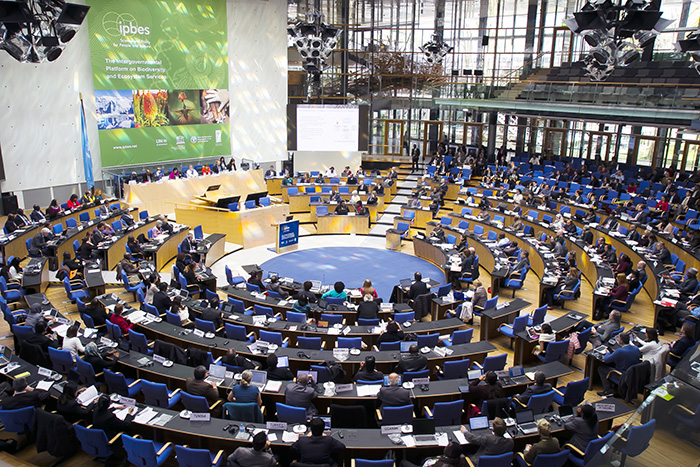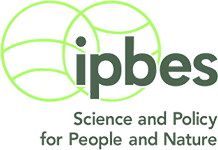Stakeholder Day and 6th Session of the Plenary of the
Intergovernmental Platform on Biodiversity and Ecosystem Services (IPBES-6)
17 and 18-24 March 2018 | Medellín, Colombia
Download ENB Meeting Reports |
||||||||||||||||||||
|
||||||||||||||||||||


| Follow @iisdrs | ||

IPBES-5 Plenary |
||
|
IPBES-6 is expected to finalize and launch five science-policy assessment reports and summaries for policy makers: a thematic assessment on Land Degradation and Restoration; and regional assessments on human induced challenges and opportunities in the Americas, Asia and the Pacific, Africa, and Europe and Central Asia. The assessments review and summarize best available evidence for decision-makers to make informed decisions that balance the needs of people and nature. All five assessments also evaluate progress and lessons learned in the context of global agreements and targets including the UN Convention to Combat Desertification (UNCCD), the Sustainable Development Goals (SDGs); the Aichi Biodiversity Targets and the Paris Agreement on Climate Change. Ahead of the meeting, the IPBES Secretariat released a series of primers providing background information and key issues discussed in the five assessments:
The five assessments are part of IPBES’s Work Programme 2014-2018 adopted at IPBES-3. The Platform adopted its first assessment reports during IPBES-4. IPBES-5 focused on institutional and procedural issues, including indigenous and traditional knowledge, policy support tools and methodologies, IPBES’s second work programme, and scoping reports for future assessments. See our analysis of IPBES-5 here. IPBES 6 will be held 18 to 24 March 2018 in Medellin, Colombia. The Plenary session will be preceded by a Stakeholder Day on 17 March which provides an opportunity for interested organizations to receive updates on the IPBES process and discuss their engagement. |
||
|
IISD Reporting Services, through its Earth Negotiations Bulletin (ENB) Meeting Coverage, provided daily digital coverage and daily reports from IPBES-6. In addition, IISD Reporting Services has produced a summary and analysis report of IPBES-6, which is now available in HTML and PDF. Photos by IISD/ENB | ||
|
IISD Reporting Services is grateful to the many donors of the Earth Negotiations Bulletin (ENB) and recognizes the following as core contributors to the ENB: the European Union and the Kingdom of Saudi Arabia. General Support for the Bulletin during 2018 is provided by the German Federal Ministry for the Environment, Nature Conservation, Building and Nuclear Safety (BMUB), Italian Ministry for the Environment, Land and Sea, Japanese Ministry of Environment (through the Institute for Global Environmental Strategies - IGES), New Zealand Ministry of Foreign Affairs and Trade, Swedish Ministry of Foreign Affairs, Government of Switzerland (Swiss Federal Office for the Environment (FOEN)), and SWAN International. Funding for translation of the Bulletin into French has been provided by the Government of France, Québec, and the Institute of La Francophonie for Sustainable Development (IFDD), a subsidiary body of the International Organization of La Francophonie (OIF). |
||

